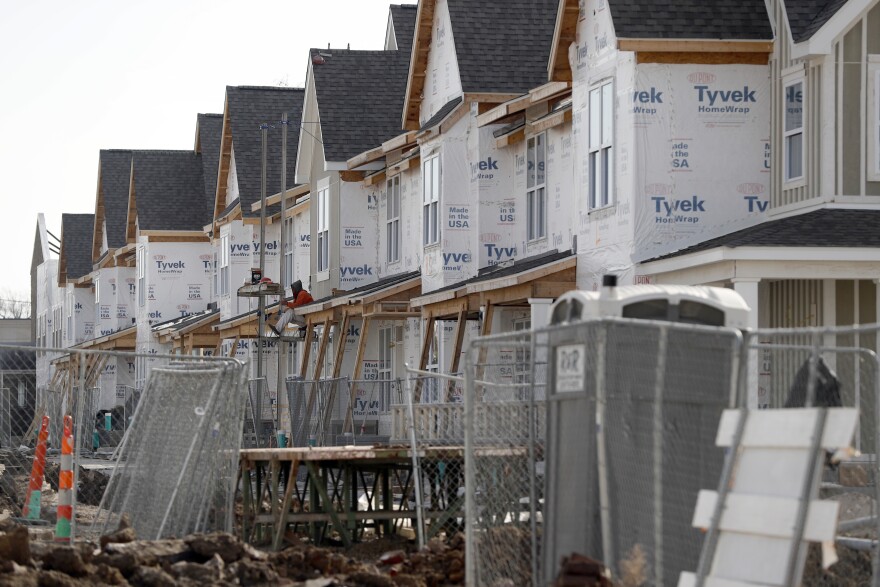Connecticut has the potential to add a lot of new housing this year. Advocates say now is the time for the state to make sure a good portion of it is affordable.
State data shows developers have thousands of housing projects in the works.
But building has slowed because of the pandemic.Residential construction is considered an essential business in Connecticut, so developers have been able to build but with fewer workers and more safety guidelines to follow.
The problem for Robert Roqueta is that the bulk of new construction is not being built for the people who need it most. Roqueta is on the Board of Representatives in the city of Stamford.
“When a developer goes for departments and goes to, to a zoning board to get units, by law, they have to give at least 10% of those units. That doesn't necessarily mean low-income people will get them.”
A nurse by day, Roqueta got involved in civics to help steer affordable housing developments. The pandemic has only strengthened his resolve.
“With people being furloughed, layoffs, and really the uncertainty of you know, the economy is more my concern, that if someone can afford $3,000 for a two bedroom now, they may be needing a place in a few months or a year.”
Jim Horan, executive director of the Local Initiatives Support Corporation Connecticut, a community development support organization, says Connecticut is at a tipping point.
“We have seen an uptick [in affordable housing], which is terrific. And a lot more of that is needed. We were on what we now realize is the tail end of the growing actions in the economy. So finally new construction was beginning to catch up with the need. Unfortunately, of course, we've now entered a recession, as new data will show. With COVID-19, things will change very rapidly.”
Horan expects there will be a significant downturn in the construction of new affordable housing.
That’s because lenders and builders will be concerned there won't be the market to support it. And the state won’t be able to subsidize it enough to make it worth their while.
“We hope that there can be longer-term housing solutions for people who have been homeless stemming from [the pandemic].”
Advocacy groups say homeowners and tenants who lost their jobs will be unable to pay monthly rent or mortgage payments when pandemic-related moratoriums are lifted.
“So we're concerned that we're going to see a bump in the number of folks who either are facing eviction or just unable to pay rent come July 1 when this eviction moratorium ends, or whenever it ends, assuming it may be extended,” said Kiley Gosselin, executive director of the Partnership for Strong Communities.
She says a quarter of all renters in Connecticut spent at least half of their income on housing last year. Many are seniors and people with disabilities who live on fixed incomes.
“Because of the pandemic, [they may be] unable to pay rent, they may not be able to access unemployment benefits or the stimulus check if they haven't filed taxes in the past.”
Gosselin says a Connecticut resident would need to earn nearly $25 an hour in order to afford a basic two-bedroom apartment. In the Bridgeport-Stamford-Norwalk metro area, that jumps to over $38 per hour.
That means unemployed residents who live in areas hardest hit by the coronavirus have some of the steepest housing costs.
“It's much more difficult to get access to things like vital documents that you need to apply for a lease, right? Or to get credit histories on folks. It's much more challenging to go in, tour apartments and view them. And we're finding that landlords are being a little more stringent on requiring more upfront rental payments out of, you know, probably nervousness for what the future of the economy holds and trying to make sure that they're secure also.”
Advocacy groups say more federal and state assistance is needed for homeowners and tenants to delay mortgage and rent payments, and secure affordable housing for a potential wave of people who will need it post-pandemic.
"What we are recommending is that there'll be a stabilization fund for the state that will likely and hopefully be funded with some federal resources," Gosselin said. "There is movement in the federal government now to try to provide some amount of rental relief that landlords and tenants would be able to apply for to help fill the gap between what they're able to pay and what is due."
Read the latest on WSHU’s coronavirus coverage here.
Do you have questions you’d like WSHU to answer in local coverage of the coronavirus? Let us know via this survey.





